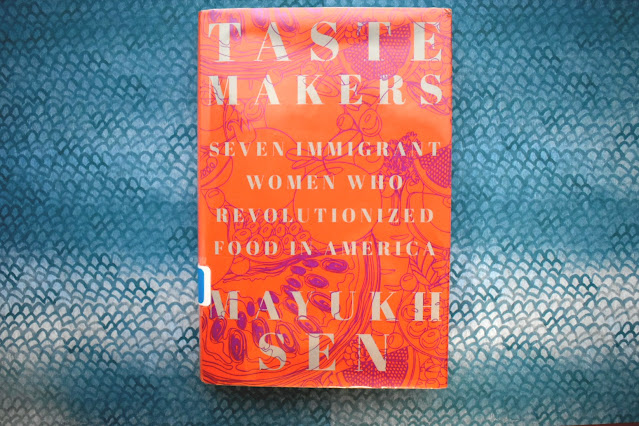Book Review: "Taste Makers" by Mayukh Sen
 |
I promise to return my copy soon. Photo by Cheyenne Trujillo. |
I fall into rabbit holes daily. "Hyper Specific Depth About Something Slightly Obscure" is a favorite genre of mine. When I read the description for this book, I immediately placed a hold for it in the Birmingham Public Library's (BPL) catalog.
Travel with me down my latest rabbit hole to hear the full review of Taste Makers: Seven Immigrant Women Who Revolutionized Food in America by Mayukh Sen.
Mayukh Sen, an award-winning food writer, writes with care and craft on seven immigrant women, representing seven different cuisines, that changed the palate of America in Taste Makers. He shows how cookbooks become books on survival, the way these women pioneered the gastronomical frontier in America, and why these women often get compared to Julia Child (and how that is a disservice).
You will not find any recipes in this book. That is not the point of Taste Makers.
Instead, you will see the revolution of cooking in America these women started, shattering stereotypes and breaking glass ceilings for themselves and other immigrant chefs centuries to come.
One of the best parts of this book is the way that Sen writes about these women. He does his best to rebuild their lives with their own words, refusing to write on any woman that does not have substantial material in her own voice.
Unfortunately, that leaves a few amazing women (Dione Lucas, Desta Bairu, and Rawia Bishara) he mentioned in the "Afterword" out of the book. Yet that does not diminish the biographical work he does for the seven women who are discussed:
- Chao Yang Buwei
- Elena Zelayeta
- Madeleine Kamman
- Marcella Hazan
- Julie Sahni
- Najmieh Batmanglij
- Norma Shirley
I enjoyed the chapters on Chao Yang Buwei, Najmieh Batmanglij, and Norma Shirley the most.
Learning about Chao Yang Buwei's rebellious background and doctorate degree in medicine gives a context to a self-made home chef that I did not expect. Taste Makers challenges your bias and expectations about women who cook, even the implicit bias you may not recognize until you read the book.
As the book progresses, you see the rippling effect that the chef before her had on the culinary world in the next chapter.
Batmanglij and Shirley both had the opportunity to cook for their own people—for other immigrants—unlike the women in the early chapters, who had to compromise parts of their own recipes so that a general audience would try their food.
Reading about how these women thrived without compromising is what makes their chapters so memorable to me.
But if you picked up this book hoping to recreate recipes of this revolution, Sen makes detailed notes and book recommendations at the end of his novel that will keep you busy in the kitchen for months. Read the "Suggestions for Further Reading" to build your own cookbook library.
If you have never thought of cooking, culinary history, or writing a cookbook as a radical act, reconsider.
But it's awfully patronizing to frame any of these women as 'forgotten' or 'overlooked' victims of cultural amnesia. Such a narrative orientation renders them passive figures in their own stories...I hope to push against the individualistic notion of creative genius. Grouping these women together allows readers to see the shaping of food in America as the endpoint of collective labor, not the work of any one extraordinary mind—Mayukh Sen
This is a timely read for Women's History Month, highlighting another way that women are "providing healing, promoting hope" in this world.
Follow the BPL on Facebook, Instagram, Twitter, and LinkedIn for more book reviews!
By Cheyenne Trujillo | Library Assistant Ⅲ, Public Relations
Comments